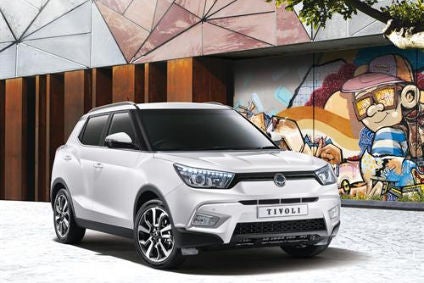
Domestic sales by South Korea’s five main automakers increased by 11.6% year on year to 141,711 units in November, from already buoyant year-earlier sales of 126,943 units, according to data released individually by the vehicle manufacturers.
The data did not include sales by South Korea’s low volume commercial vehicle manufacturers, including Tata-Daewoo and Daewoo Bus Corporation, which typically account for less than 2% of the domestic market combined.

Discover B2B Marketing That Performs
Combine business intelligence and editorial excellence to reach engaged professionals across 36 leading media platforms.
The domestic vehicle market, and the domestic economy as a whole, continued to benefit from government stimulus including reduced taxes and historically-low benchmark interest rates of 1.5%. New models, particularly SUVs, were also helping to stimulate demand.
At the end of August the government cut consumption tax on cars and on other consumer goods from 5% to 3.5% to stimulate consumer spending and offset weak exports. The lower tax rates will be in place until the end of the year and have had a significant effect on the domestic vehicle market so far.
In the first 11 months of 2015, domestic sales rose by 8.1% to 1,404,329 units, from 1,299,655 units in the same period of last year, reflecting particularly strong growth in the second half of the year.
Global sales among the country’s ‘big-five’ automakers jumped by 5% to 822,481 units in November from 783,189 units a year earlier. Cumulative 11-month sales were just slightly higher at 8,060,439 units compared with 8,057,363 units previously, with weaker sales in the first half of the year.
The improving second half global performance reflects rising demand at home, rebounding sales in China after months of decline and continued strong demand in other key overseas markets such as India and North America.
Hyundai Motor‘s global sales increased by 4.9% to 451,838 units in November, from 430,792 units a year earlier, reflecting a sharp rise in domestic sales and also an improving overseas performance following a recent intensification of marketing campaigns in key global markets.
In the first 11 months of the year, global sales were still negative, albeit by just 0.9% at 4,448,969 units compared with 4,487,121 units a year earlier.
Hyundai’s domestic sales jumped by 16.9% to 65,166 units in November, from 55,725 units a year earlier, reflecting the recent launch of the new Avante subcompact car and strong demand for the larger Sonata model. Demand for SUVs such as the Tuscon and Santa Fe also remained strong.
Over the 11-month period, Hyundai’s domestic sales rose by 2.6% to 632,061 units, from 615,834 units a year earlier, reflecting its struggle to keep pace with smaller domestic and imported brands earlier in the year.
Overseas sales increased by 3.3% to 386,672 units in November, from 374,301 units a year earlier, reflecting continued strong demand in key markets such as North America and India and stabilising sales in China.
Kia Motors‘ global sales rose by 6.8% to 286,303 units in November, from 268,132 units a year earlier, with new models helping to drive sales higher both at home and abroad.
Cumulative global sales in the first 11 months of the year were 0.6% lower at 2,742,899 units, however, reflecting weak exports to China and Eastern Europe throughout most of the year.
Domestic sales rose by 12.4% year on year to 50,031 units in November, helped by strong demand for the Sportage SUV and the newly launched K5 passenger car.
Overseas sales increased by 5.7% to 236,272 units last month, with signs that demand in China has stabilised and as sales remained strong in key markets such as North America.
GM Korea‘s global sales fell by 2.2% to 51,502 units in November, from 52,218 units a year earlier, reflecting weaker domestic sales after a sharp rebound in the previous month. Cumulative global sales over the first 11 months of the year were just over 2% higher at 560,984 units.
Domestic sales fell by 7.3% to 11,446 units last month, while sales of CBU exports were 0.7% lower at 39,606 units.
Renault-Samsung‘s global sales fell by 5.5% to 20,873 units in November, compared with 19,935 units a year earlier, on sharply lower domestic sales after months of strong growth.
Domestic sales fell by 30% year on year to 6,006 units last month as competition from its larger domestic rivals continued to strengthen, while exports rose by 10.1% to 14,867 units.
In the first 11 months of the year, Renault-Samsung’s global sales increased by 39% to 203,528 units.
Ssangyong Motor, owned by India’s Mahindra & Mahindra, reported a 24.1% rise in factory sales in South Korea to 12,415 units in November, from 10,000 units a year earlier, on strong domestic demand which more than offset a sharp drop in exports.
Domestic sales jumped by over 56% year on year to 9,062 units, reflecting continued strong demand for the Tivoli SUV. CBU exports fell by more than 20% to 3,353 units, reflecting particularly weak demand in eastern Europe where local capacity also was coming on stream.
In the first 11 months of the year, combined domestic sales and CBU exports were 1.8% higher at 129,425 units.
South Korean carmakers: domestic/overseas sales by brand, November 2015
Sources : www.AsiaMotorBusiness.com, industry sources.






